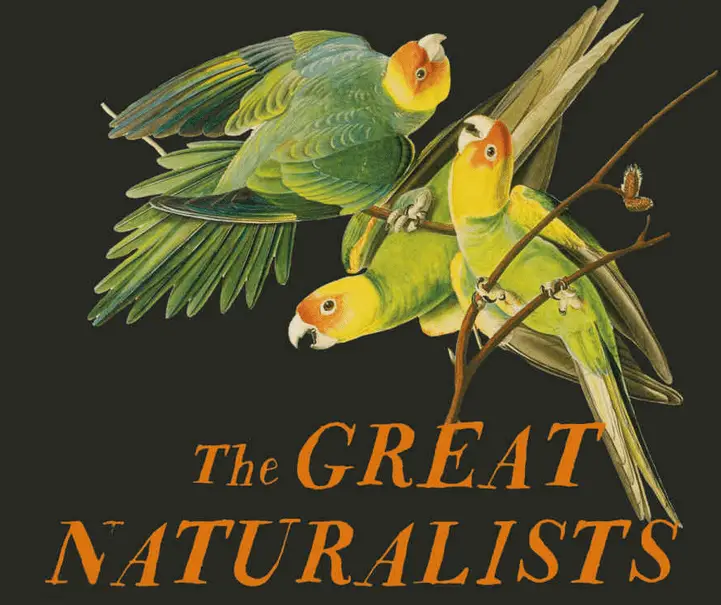The study of natural history – zoology, botany, geology, paleontology, etc. — is among the most fascinating and rewarding undertakings of humankind. It’s equally fascinating and rewarding to study the history of natural history, itself, the story of the men and women who broke new ground, scoured new territory, conceived new ideas, and shed new light on the secret, inner workings of the natural world.
For anyone interested in such monumental figures, publisher Thames & Hudson’s The Great Naturalists, edited by former Head of Collections for the London Natural History Museum, Robert Huxley, is a must-own book. Originally published in 2007 as a hefty and expensive hardcover, The Great Naturalists is now available, as of late last year, in an affordable, pocket-sized paperback edition, running 272 pages, including two glossy inserts with a total of 22 color illustrations.
The Great Naturalists covers 39 of the most important men and women in the history of science through four historical periods: The Ancients, The Renaissance, The Enlightenment, and finally, The 19th century. Beginning with the Greek philosopher Aristotle and ending with botanist Asa Gray, the book doesn’t cover the scientific movers and shakers of the 20th and 21st centuries since, as editor Huxley explains, it was in the late 19th century that science became professionalized, thus bringing an end to the age of the amateur, self-made naturalists.
The Enlightenment is the longest period included, spanning two centuries and some 19 individuals, such as Carl Linnaeus, the inventor of the modern classification system of binomial nomenclature, Comte de Buffon, the first person to put forth a secular theory for the origin of the Earth, Charles Darwin’s grandfather Erasmus Darwin, James Hutton, the discoverer of deep time, and the father of paleontology, George Cuvier.
Each profile follows the same format, introducing the naturalist with a quote either about them or, more often, taken from their own writings. The individual profiles are written by a different expert who is either a working scientist or a historian who’s published on the naturalist in question. The entry on Danish anatomist turned marine biologist turned geologist turned priest, Nicolas Steno, is written by Alan Cutler, the author of his riveting biography, The Seashell on the Mountaintop.
A few of the book’s contributors do pull double, triple, or even quadruple-duty, however. Botanist David Williams profiles the Machiavellian museum curator Richard Owen and ichthyologist/geologist Louis Agassiz, while British Museum curator Jill Cook tells the tales of James Hutton, the downright eccentric Oxford geologist William Buckland, and Charles Lyell, whose geologic theories would strongly influence Charles Darwin.
Mycologist Sandra Knapp does the most heavy lifting with the entries on Comte de Buffon, early evolutionist Jean-Baptiste Lamarck, Charles Darwin himself, and Darwin’s evolutionary co-conspirator, Alfred Russel Wallace. In the case of the opening and shortest section, The Ancients, botanist David Sutton authors or co-authors three of only four entries: father of botany Theophrastus, farther of pharmacology Dioscorides, and encyclopedist Pliny the Elder – basically everybody but Aristotle, who goes to botany author Julia Brittain.
All of the contributors’ credentials appear to be beyond repute, with one notable exception which – being the dinosaur-loving nerd that I am – jumped out at me. Two of the entries, on Robert Hooke and Antony van Leeuwenhoek, are written by Brian J. Ford, the prolific author and essayist of popular science books who since 2012 has advocated the retrograde hypothesis that all dinosaurs were amphibious. That said, Ford’s two entries deal with pioneering figures in the field of microbiology, not paleontology, and no mention is made of his disreputable 2018 book on dinosaurs in his contributor’s profile.
Given the breadth of individuals covered in The Great Naturalists, it should be expected that the actual entries themselves are not particularly deep, and provide only a basic, historical sketch of each person and their major scientific contributions. Fortunately, the book comes with an extensive bibliography, organized by entry, with suggestions for further reading. I can’t wait to start expanding my personal library using this as a guide. There’s also an index for quick and easy referencing of particular topics.
If I have one complaint about The Great Naturalists, if might be that the brevity of the entries limits most of the authors to only exploring their subject’s accomplishments, and not their follies as well. We’d do well to remember that science, as a discipline and a history, is made up of both. No mention is made of the fact that Renaissance era naturalists Ulisse Aldrovandi and Konrad Gessner wrote extensively about (and evidently wholly believed in) the existence of dragons. Nor is there anything on Buffon’s theory of American degeneracy, a clear case of nationalism masquerading as science.
On a related and even more serious note, the fact that Louis Agassiz expounded dangerous ideas regarding so-called scientific racism is not even alluded to in his section, and neither Stephen Jay Gould’s The Mismeasure of Man or Christopher Irmscher’s 2013 biography of Agassiz, both of which tackle this facet of his legacy, are listed under the suggestions for further reading on him. I hope if this new paperback edition of The Great Naturalists sells well – it deserves to – as a revised and expanded edition of this indispensable reference book will be something all students of the history of natural history can look forward to.
AIPT Science is co-presented by AIPT and the New York City Skeptics.
Join the AIPT Patreon
Want to take our relationship to the next level? Become a patron today to gain access to exclusive perks, such as:
- ❌ Remove all ads on the website
- 💬 Join our Discord community, where we chat about the latest news and releases from everything we cover on AIPT
- 📗 Access to our monthly book club
- 📦 Get a physical trade paperback shipped to you every month
- 💥 And more!












